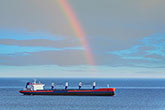Wilhelmsen unveils agency by air at Nor-Shipping
Published by Angharad Lock,
Digital Assistant Editor
Dry Bulk,
Marking a seismic shift in just how ships agents can support their customers, Wilhelmsen Ships Service (WSS) will soon be delivering its agency essentials via drone.
Marius Johansen, VP Business Solutions & Marketing, WSS Ships Agency explained: “Whether it is deliveries of critical documents or vital medical supplies, tank inspections, or monitoring cargo and stockpile levels, we believe semi-autonomous drone flights can support and further enhance what our ships agency team can offer our customers”.
“Relied upon by owners, operators, vessels and crew to get spare parts, medicine, documents, or cash to master where it needs to be at moment’s notice, drone delivery is a natural extension of our existing agency service portfolio”.
Dispensing with the need for launch boats to deliver such essentials to vessels at anchorage, along with cutting delivery times, Johansen estimates drone flights will also slash costs. With launch vessels typically costing on average US$1500, he suggests a drone delivery would eventually come down to costing just US$150.
Launching a large scale working pilot project in one of the world’s busiest ports in 2017, in spite of the complexity of global aviation rules and restrictions placed on unmaned aerial vehicles, for WSS drone delivery is very much here to stay.
Discussing the project for the duration of Nor-Shipping the WSS agency team will be on the Wilhelmsen stand, A1-7 in the Disruptive Sustainability hall.
Nor-Shipping 2017 takes place in Oslo and Lillestrøm, Norway, from 30 May - 2 June 2017.
Read the article online at: https://www.drybulkmagazine.com/shipping/19052017/wilhelmsen-unveils-agency-by-air-at-nor-shipping/
You might also like
Baltic Exchange: Dry Bulk Report – Week 5
The Baltic Exchange provides an update on the Dry Bulk markets for Week 5.

